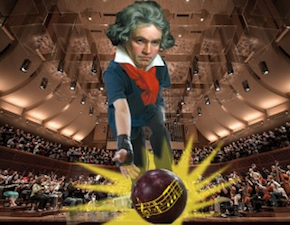
Curious and curiouser — Ludwig van Beethoven is all around us, in 2013. What's the significance of the year? That's just it: nothing. Not a centennial, bicentennial, or even a round-number anniversary for the composer, who was born in 1770 and died in 1827.
And yet, the San Francisco Symphony, which has two dozen of his works in this season, starts an 11-day Beethoven Festival on Thursday; meanwhile at Stanford, Bing Hall's first season has a major Beethoven Project; there are Beethoven festivals in Bonn (that's understandable with hometown pride), Vienna, Chicago, Brunswick, Detroit, and so on. Beethoven rules this year and every year. How come?
John Mangum, SFS director of artistic planning, who assists music director Michael Tilson Thomas with programming, says the reason is obvious:
"Beethoven is the composer who speaks most directly to the largest number of audience, best-known, most universally recognized, a revolutionary creator, forerunner to many 20th-century greats. Without Beethoven, Mahler for example, couldn't have become who he was."

The relationship is also personal. As most music lovers, Mangum too had an early experience with Beethoven. Born and raised in Danville, before a career with the New York Philharmonic, Mangum's "introduction to music was right here, in Davies Hall, Roger Norrington conducting Beethoven's Eighth and Ninth symphonies." (Girding the globe under the sign of Beethoven, my own "first" was the Seventh Symphony in Budapest's Franz Liszt Academy.)
The SFS festival is part of a multi-season exploration of Beethoven's music, including acclaimed recordings of several symphonies. There is emphasis at this series of concerts on some of the composer's early works.
The festival, says MTT, "is an opportunity, in the context of major masterpieces, to hear works that were precursors to them; these are unusual pieces that many people have not had a chance to hear in live performance."
Both MTT and Mangum call attention to a special three-hour matinee event on May 4, combining performance and discussion exploring Beethoven's music and impact. Participants include John Adams, whose Beethoven-tribute Absolute Jest will be excerpted at the symposium, along with Saint Lawrence String Quartet performances of movements from Beethoven quartets that influenced Adams.

Festival-opening concerts on May 2 and 3 include the 19-year-old Beethoven's Cantata on the Death of Emperor Joseph II, the Symphony Chorus performance of the song "Adelaide," and the Second Symphony. The cantata features mezzo-soprano Tamara Mumford, tenor Barry Banks, and bass-baritone Andrew Foster-Williams, all making their SFS debuts, and returning soprano Sally Matthews.
The entire Adams Absolute Jest will be given May 4, 5, and 9, in addition to the Fourth Symphony, tenor Michael Fabiano performing the Beethoven song cycle To the Distant Beloved, and the SFS premiere of the Three Equali for Four Trombones.
Beethoven holds a place of honor in the history of the trombone as the first major composer to employ it in the orchestration of symphonies, beginning with his Symphonies Nos. 5 and 6.
Beethoven's late masterpiece, Missa solemnis" — with Fabiano, soprano Laura Claycomb, mezzo Sasha Cooke, and bass Shenyang — returns, paired with excerpts from Palestrina's 1562 Mass for Pope Marcellus II on Program 3, May 10 and 11. (Marcello Cervini degli Spannochi died on May 1, 1555, three weeks after becoming Pope; and yet, there were five Popes with even shorter reign — music festivals can serve as an important learning opportunity.)

